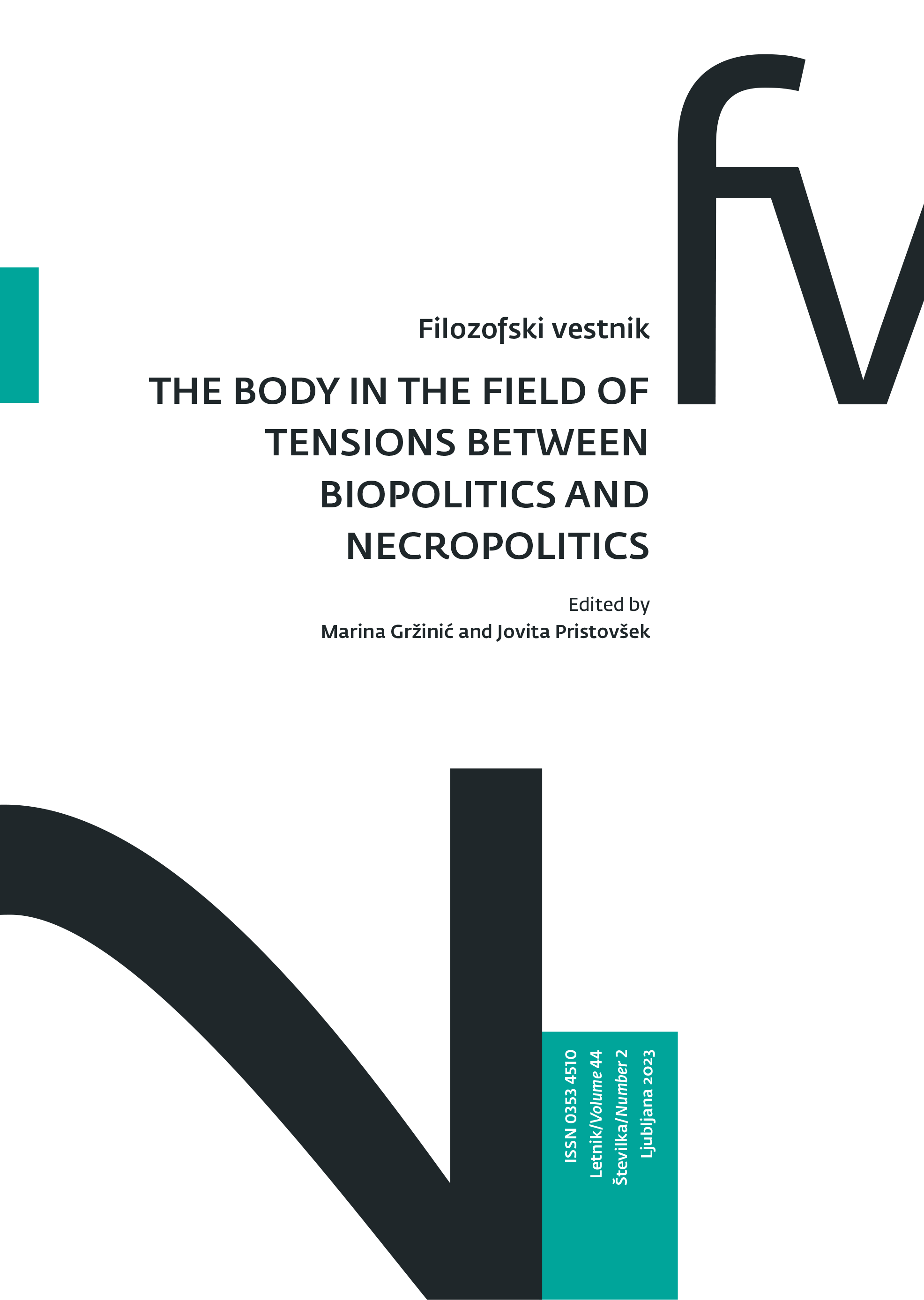The Body as Mass Media in the Livestream Regime
DOI:
https://doi.org/10.3986/fv.44.2.03Keywords:
biopolitics, necropolitics, gore capitalism, livestream regime, gender, sexualityAbstract
In the article we discuss the meaning of the body in its material dimension in relation to its transformation in the current context, which is determined by the multi-layered convergence of biopolitics (Foucault 1978–79), necropolitics (Mbembe 2003), digital psychopolitics (Han 2014), and gore capitalism (Valencia 2010). It is an inquire of the ways in which the contemporary body becomes a form of mass media for certain populations who choose to consent to the mandate of making themselves entrepreneurs of their own bodies within the livestream regime (Valencia 2016, 2018). The author analyzes a variety of representations of femininity taking physical form g-locally in bodies, which—in an effort to comply with capitalist mandates and with binary choreographies of gender and sexuality—become businesses themselves.
Downloads
References
Berardi, Franco “Bifo”. And: Phenomenology of the End; Sensibility and Connective Mutation. South Pasadena, California: Semiotext(e), 2015.
Brito-Alvarado, Xavier, and José Capito Álvarez. “Neoliberalismo como necropolítica zombi.” Argumentos: Revista de Crítica Social, no. 22 (October 2020): 252–79.
Colomina, Beatriz. Domesticity at War. Cambridge: MIT Press, 2007.
Emmelhainz, Irmgard. The Tyranny of Common Sense: Mexico’s Post-Neoliberal Conversion. Albany: State University of New York Press, 2021. Originally published as La tiranía del sentido común: La reconversión neoliberal de México (Mexico City: Paradiso, 2016).
Federici, Silvia. “In Praise of the Dancing Body.” Gods and Radicals (blog). A Beautiful Resistance, August 22, 2016. https://abeautifulresistance.org/2016/08/22/in-praise-ofthe-dancing-body/.
Foucault, Michel. The Birth of Biopolitics: Lectures at the Collège de France 1978–79. Edited by Michel Senellart. Translated by Graham Burchell. Basingstoke: Palgrave Macmillan, 2008.
Franco, Gloria. “ ‘Las convenientes’, la dura competencia de ‘Las prepago.’ ” El Tiempo, February 27, 2013. https://www.eltiempo.com/archivo/documento/CMS-12623834.
Fuerza Informativa Azteca. “¿Qué son las buchonas? Emma Coronel y las mujeres del narco.” February 24, 2021. https://www.tvazteca.com/aztecanoticias/notas/buchonas-quienes-son-mujeres-narco-emma-coronel-especiales.
Guattari, Felix, and Suely Rolnik. Micropolítica: Cartografías del deseo. Translated by Florencia Gómez. Madrid: Traficantes de Sueños, 2006.
Hakim, Catherine. Erotic Capital: The Power of Attraction in the Boardroom and the Bedroom. New York: Basic Books, 2011.
Han, Byung-Chul. Psychopolitics: Neoliberalism and New Technologies of Power. Translated by Erik Butler. London: Verso, 2017. Originally published as Psychopolitik: Neoliberalismus und die neuen Machttechniken (Frankfurt am Main: S. Fischer, 2014).
Heynen, Hilde. Review of Domesticity at War, by Beatriz Colomina. Journal of the Society of Architectural Historians 67, no. 4 (December 2008): 623–24. https://doi.org/10.1525/jsah.2008.67.4.623.
Jay, Martin. “Scopic Regimes of Modernity.” In Vision and Visuality, edited by Hal Foster, 3–27. New York: Dia Art Foundation, 1988.
Lissardy, Gerardo. “Por qué están llamando ‘campos de concentración’ a los lugares de detención de inmigrantes en Estados Unidos.” BBC News World, June 27, 2019. https://www.bbc.com/mundo/noticias-internacional-48781955.
Mbembe, Achille. “Necropolitics.” Translated by Libby Meintjes. Public Culture 15, no. 1 (Winter 2003): 11–40. https://doi.org/10.1215/08992363-15-1-11.
Toret, Javier, and José Pérez de Lama. “Devenir cyborg, era post-mediática y máquinas tecnopolíticas. Guattari en la sociedad red.” Tecnopolítica. April 15, 2013. https://tecnopolitica.net/content/devenir-cyborg-era-postmediatica-y-maquinas-tecnopolitica-guattari-en-la-sociedad-red.
Valencia, Sayak. “El régimen está (transmitiendo en) vivo.” Re-visiones 9 (2019). https://dialnet.unirioja.es/servlet/articulo?codigo=7211193.
Valencia, Sayak. Gore Capitalism. Translated by John Pluecker. Semiotext(e) Intervention Series 24. South Pasadena, California: Semiotext(e), 2018. Originally published as Capitalismo Gore (Barcelona: Melusina, 2010).
Valencia, Sayak. “(Necro)Masculinidad, Estado-Nación y democracia.” Paper presented at the Proyecto Ballena, “Vida y Política,” organized by Centro Cultural Kirchner, Buenos Aires, December 4, 2020. YouTube video, uploaded by Centro Cultural Kirchner, December 16, 2020, 54:48. https://youtu.be/MDrw_D_5AKA.
Valencia, Sayak. “Necroscopía, masculinidad endríaga y narcografías en las redes digitales.” In #NetNarcocultura: Estudios de género y juventud en la sociedad red. Historia, discursos culturales y tendencias de consumo, edited by Virginia Villaplana Ruiz and León Olvera Alejandra, 39–60. Bellaterra: Institut de la Comunicació, Universitat Autònoma de Barcelona, 2022.
Valencia, Sayak. “Psicopolítica, celebrity culture y régimen live en la era Trump.” Norteamérica 13, no. 2 (July/December 2018): 235–52. https://doi.org/10.22201/cisan.24487228e.2018.2.348.
Valencia, Sayak, and Katia Sepúlveda. “Del fascinante fascismo a la fascinante violencia: Psico/Bio/Necro/Política y mercado gore.” Mitologías Hoy 14 (December 2016): 75–91. http://doi.org/10.5565/rev/mitologias.395.
Valencia, Sayak, and Liliana Falcón. “From Gore Capitalism to Snuff Politics: Necropolitics in the USA-Mexican Border.” In Necropower in North America: The Legal Spatialization of Disposability and Lucrative Death, edited by Ariadna Estévez, 35–59. Cham, Switzerland: Springer International, 2021.
Downloads
Published
How to Cite
Issue
Section
License
Copyright (c) 2023 Authors

This work is licensed under a Creative Commons Attribution-ShareAlike 4.0 International License.
Authors guarantee that the work is their own original creation and does not infringe any statutory or common-law copyright or any proprietary right of any third party. In case of claims by third parties, authors commit their self to defend the interests of the publisher, and shall cover any potential costs.
More in: Submission chapter





